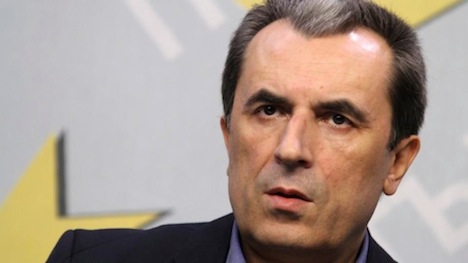The good news is that after months of uncertainty, Bulgaria has a new government.![]()
The bad news is that, in taking office, the new Bulgarian prime minister Plamen Oresharski warned his country that he wouldn’t make them rich and prosperous, but that he would work to ensure that over the course of his potentially four-year term in power, he would work to bring more hope and confidence that Bulgaria is ‘on the right track.’
Talk about lowering expectations.
After losing power in July 2009 just months after the global financial crisis, prime minister Sergei Stanishev and the center-left Bulgarian Socialist Party (BSP, Българска социалистическа партия) and its allies triumphed in the parliamentary elections earlier this month over his successor, Boyko Borissov and the center-right Citizens for European Development of Bulgaria (GERB, Граждани за европейско развитие на България).
So within two election cycles, Bulgarians have swung from the left to the right and, having indicated their dissatisfaction with both, are turning to a modified center-left government, with Oresharski, a former finance minister leading a semi-technocratic government supported by the Bulgarian Socialists and the third-largest party in Bulgaria’s parliament, the Movement for Rights and Freedoms (DPS, Движение за права и свободи), a liberal party that represents ethnic Turks and other Muslims.
Oresharski served as finance minister in Stanishev’s previous government from 2005 to 2009 in a career that’s spanned working in Bulgaria’s finance ministry since the early 1990s. As finance minister, he worked to lower the Bulgarian corporate tax rate to 10% in 2007 and then followed up with a flat-tax rate of 10% on all personal income in 2008.
As prime minister, Oresharski has appointed Petar Chobanov as his own finance minister. Chobanov himself is not technically a member of the Bulgarian Socialists, though he led the finance ministry’s forecasting agency under Oresharski in the previous government. Chobanov, like Oresharski, leans toward a conservative fiscal policy in a country that, unlike much of Europe, has a strong budgetary outlook — its public debt load is just around 18% of GDP. Nonetheless, Bulgaria hasn’t escaped the stagnant economic conditions that have plagued the rest of Europe, with GDP growth of less than 2%, an unemployment rate of 12.6% as of spring 2013, and an aging, declining population that’s shrunk by nearly 1.5 million since the 1980s. Bulgaria and its neighbor Romania remain the two poorest countries in the European Union. Continue reading Who is Plamen Oresharski?
